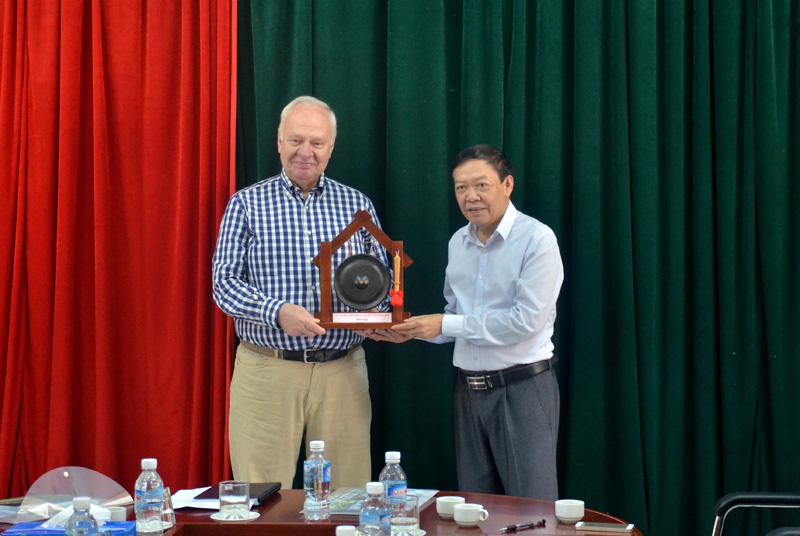
(HBO) – Under a tourism cooperation programme, the Department of Culture, Sports and Tourisms of the northern province of Hoa Binh and the Hanoi Department of Tourism joined hands with Sunsmile Travel Vietnam Company Limited to organise a fact-finding team to build a Hanoi-Hoa Binh tour.
The team was joined by Konstantin Vnukov, Ambassador of Russia to Vietnam and his spouse, along with staff members of the Embassy of Russia in Vietnam and the Hanoi Department of Tourism.

Bui Ngoc Lam, Director of the Hoa Binh
Department of Culture, Sports and Tourism presents a Muong gong to the Embassy
of Russia.
At a working session, Director of the
provincial Department of Culture, Sports and Tourism Bui Ngoc Lam stressed the
long-term friendship between Russia and Vietnam and Hoa Binh province in
particular, as well as the province’s tourism potential and strengths.
The Hoa Binh hydropower plant, built on
the Da river, is a construction of the century and a proof of the friendship
between the two countries. More than 1,300 experts from the Soviet Union (currently
Russia) and 40,000 Vietnamese engineers and workers participated in the
construction of the plant, contributing to the country’s industrialisation and modernisation.
After the trip, the delegation is expected to introduce Hoa Binh to
international friends, especially Russian tourists.
On behalf of the delegation, Ambassador
Konstantin Vnukov thanked the host for their warm welcome. He said this visit
was not his first in Hoa Binh and each gave him a different feeling. Hoa Binh
is not only marked as the place of special friendship between people of the two
countries, but also as a place of charming natural landscape and great tourism
potential, he said.
The Russian Embassy will work to bring
more foreign tourists, including Russian visitors, to Vietnam and Hoa Binh province.
On the occasion, leaders of the tourism
departments of Hoa Binh and Hanoi presented souvenirs to the Russian Ambassador
and staff members of the embassy.
Afterwards, the delegation paid a visit to
Ke hamlet in Hien Luong commune (Da Bac district), met with families operating
homestay services and watched traditional art performances. The delegation then
came back to Hoa Binh city to visit the Hoa Binh hydropower plant./.
The Standing Board of the Hoa Binh provincial Party Committee has agreed in principle on a proposal by the Standing Board of the Party Committee of Hoa Binh city to gather feedback on the city’s 1:2000 zoning plan, which forms part of its broader urban development strategy.
Hoa Binh province has made notable progress in public administration reform and digital government development, with the satisfaction index among citizens and businesses reaching over 84%, according to recent government evaluations.
Thanks to great efforts by local authorities in recent times, the governance and public administration performance of Mai Chau district has been significantly improved.
In the afternoon of June 6, the Party Committee, the People's Council, the People's Committee and the Fatherland Front of Lac Son district solemnly held a meeting to celebrate the 139th anniversary of the district's founding (1886–2025) and the 79th anniversary of the establishment of the district's Party Committee (1946–2025). There was the attendance of Mr. Bui Van Thang, the Vice Chairman of the Provincial People's Council; Mr. Quach Tat Liem, the Vice Chairman of the Provincial People's Committee; Ms. Dang Bich Ngoc, the Deputy Head of the National Assembly Delegation of the province; as well as the former leaders of the province and district through various periods, who are the natives of the district.
Implementing the Politburo’s Resolution No. 57-NQ/TW on breakthroughs in science – technology, innovation, and digital transformation is a golden opportunity for the northern mountainous province of Hoa Binh to renew growth model, improve competitive edge and shorten digital gap.
Resolution 57-NQ/TW, issued by the Politburo on December 22, 2024, identifies sci-tech, innovation, and digital transformation as strategic breakthroughs to build a developed and prosperous nation. In Hoa Binh province, this spirit is not just a slogan, it’s being put into action through concrete initiatives that form a "new development triangle”: digital citizenship, digital economy, and digital administration.



